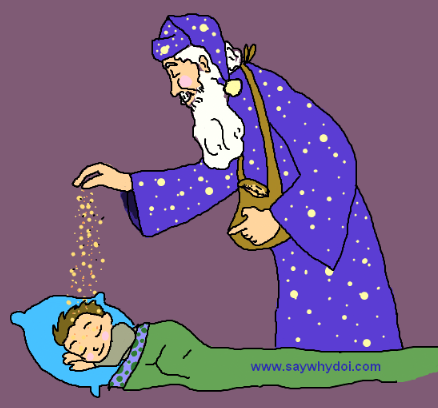Sleep, rheum, gound, gook, gunk, goop, stuff, sludge, gunge, goo, sleepydust, sleepysand, crusties, or eye boogers: Whatever you want to call them, we’ve all found ourselves waking up to having something in our eyes in the morning at some stage. Why do we get this gunk in our eyes?
The Mythological Answer
The story goes that every night the Sandman comes and sprinkles magical sleepy sand or dust into childrens eyes which sends them to deep sleep. The remains of his magical ingredient are seen in the morning as golden nuggets or gloopy sleep in the eyes.

The Scientific answer
The main reason that we get sleep in the eyes is due to the eyes being closed all night. And it’s all down to the fact that at night when our eyes are closed, tear drainage is impaired.
Our eyes need to be kept moist by a film of tears at all times. During the day, we blink to wash our eyes with a film of tears and this keeps the eyes well-nourished and oxygenated, as well as washing away any waste products or impurities like dust or irritants in the eye. Daytime blinking also helps drain away our tears. Where do the tears drain to? If you look in a mirror and pull down the corner of your eye closest to your nose, on the inside of your bottom eyelid you’ll see a little hole. This is one of the exit routes for tears. There is another one on the upper lid. The scientific name for these two holes is the lacrimal puncta. From here the tears drain away into several tubes before eventually passing into the nose. This passageway of tears draining into the nose explains why our nose runs when we cry. Incidentally, these passages between the nose and eyes are not a one-way street, and some passage of stuff from the nasal cavity can pass up into the eyes too, although usually this happens most when we have an awful cold and are very congested.
When we sleep, tear drainage is less efficient, partly because we don’t blink. With blocked tear drainage, the tears hang around. The tears we make at night are made of a lot of components including: water, mucusy mucin, oils, proteins, and a few other small molecules. When the tears hang around, a combination of the dry air around you and the body’s heat causes the water component of the tears to slowly evaporate. As evaporation occurs, the remaining “tears” become thicker and more gloopy. The hard sand-like golden nuggets you sometimes find in your eye are examples of tears that have had so much water evaporate, that they’ve become a precipitate.
Why do we get more sleep some days than others?
At times when our body is under the stress of inflammation which may be due to having a cold, flu or some other bug, eye irritation or infection, allergies, or even something like a food intolerance, you may see your eyes being crustier than usual. Why is this? Because we have a lot more thick, gloopy mucus around during inflammation.
Mucus production is one of the body’s responses to inflammation. The body makes it to form a protective coating over your tissues to prevent inflammatory damage. Due to the close link between the nose and the eyes, if you have more mucus in your nasal passages, some will flow back into your eyes when you lie down for the night and this can result in crustier eyes in times of inflammation.
Not only will the excess mucus make your eyes crustier than usual, but it may also irritate your eyes, encouraging even more watery tear production to clean the mucus away. This may partly explain why we get watery eyes when we have a cold with a congested nose. Mucus travelling up to the eyes and irritating them may also explain why we sometimes get watery eyes when we sneeze.
Inflammation is sometimes why people find they have “sleep” in their eyes even during the day, in spite of cleaning their eyes out that morning.
* * *
So there you have it: why we get sleep in the eyes. I still however rather like the sandman dust version of the story!
Related Products
Note:
This site is working in affiliation with Amazon.com (for USA visitors) and The Nutri Centre (for UK visitors). If you like a product that was recommended anywhere on this website, please consider buying these products via the links on this site, to help keep this website running. Thanks ![]()



Thanks for the post I actually learned something from it! Very good content on this site as always. Looking forward to new post.
Wow! Thank you! I continually wanted to know this!
You my pal are a genius
Thank you for this article. It clears a lot of things up, LOL. The gook in your eyes can also be affected by the type of foods you eat. Following a low inflammatory diet can help to reduce the amount of gook.